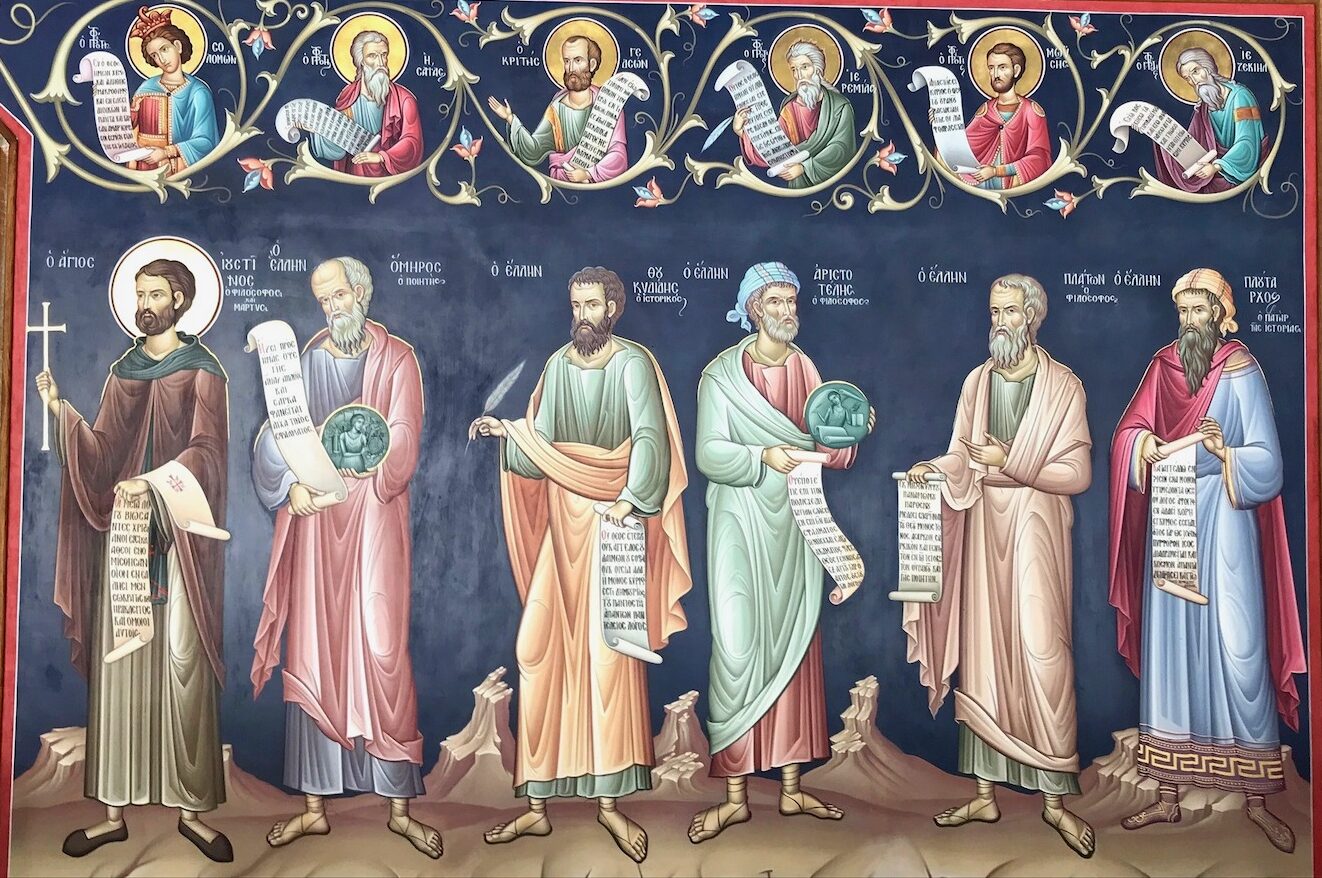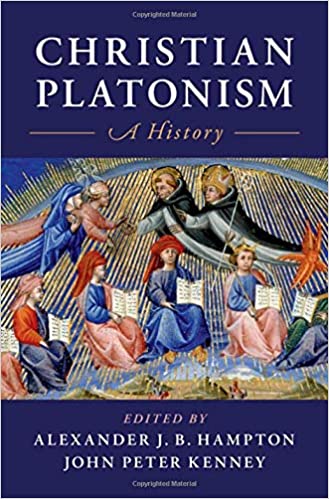Evans, GA. In recent years, multiple works have defended Christian Platonism in passing as part of a larger argument, e.g., Craig A. Carter’s Interpreting Scripture with the Great Tradition and Jordan Cooper’s Prolegomena. Others have undertaken a more focused defense of Christian Platonism (or particular aspects of it), including Hans Boersma’s Heavenly Participation, Paul Tyson’s Returning to Reality, and Andrew Davison’s Participation in God. What we have not seen heretofore is a resource that gives a basic overview of what “Christian Platonism” has meant and looked like historically, as well as expositions of recurring concepts in Christian Platonism and contemporary engagements with said concepts, all in one book.
We now have such a resource in Christian Platonism: A History, edited by Alexander J. B. Hampton and John Peter Kenney. As the title implies, much of the book is spent surveying the ways in which Christianity and Platonism have influenced each other throughout history, from the early years of Christianity through the medieval period and up to the present. Additionally, as mentioned above, contributors treat not only recurring concepts in Christian Platonism—e.g., divine participation and ideas as thoughts of God—but also ways in which Christian Platonism can be brought to bear on contemporary issues such as environmental concerns and the meaning of friendship.
For those who are unfamiliar with the notion of Christian Platonism, “The core claim of Platonism is that there is a distinct subject matter for philosophy, that the intelligible world is that subject matter, and that it has an explanatory primacy. Christian Platonism will obviously have no difficulty in appropriating a metaphysical claim for the primacy of the intelligible over the sensible or the immaterial over the material” (15).
What makes Christian Platonism distinctively Christian is that “Platonists, qua Platonists, are in principle indifferent to history, whereas Christians are essentially dependent on historical claims,” especially those concerning the life, death, and resurrection of Jesus Christ. Platonism is thus utilized by Christians as a “theoretical framework,” from which ideas and concepts are adopted insofar as they are compatible with Christian doctrine and aid in its articulation (31). The book as a whole, then, deals with the various ways in which Christian thought has borrowed (and continues to borrow) from Platonism.
Historically, however, some have questioned whether Christian Platonism can rightly be called “Christian,” a suspicion that is often associated with the “Hellenization hypothesis” put forward by Adolf von Harnack. On this theory, Greek philosophy in general and Platonism in particular is thought to be a “contaminating” influence that corrupted Christianity early on and must be removed in order to restore the “pure and simple essence of Christianity, free from Hellenistic influences” (5, 79).
People with such concerns tend to think that Christians have uncritically adopted Platonist ideas wholesale, thus leading to the dilution or abandonment of Christian distinctives. In reality, many earlier Christians were selective in their engagement with Platonism—they “appropriated and redefined aspects of Platonic monotheism, rethinking elements useful for their exegetical and creedal traditions while constructing novel ideas that better suited the creedal commitments of orthodox Christianity” (179). The chapters by John Peter Kenney and Rudi A. te Velde in particular are an excellent demonstration of this truth.
Unfortunately, while this book shows that Christianity and Platonism have traditionally harmonized with one another, there is a noticeable gap in its historical corroboration of this fact, in which the Reformation is altogether absent. In fairness, the editors note that “a number of Protestant thinkers continued to embrace and develop Christian Platonist perspectives,” even as others “sought to disentangle what [they] conceived as authentic biblical Christianity from what [they] saw as the distortions of philosophical traditions” (5).
This is all that is said on the subject, however—the book’s historical survey passes directly from “Northern Renaissance Platonism from Nicholas of Cusa to Jacob Böhme” to “Christian Platonism in Early Modernity,” which begins with a discussion of René Descartes. Given that the Reformation is such a critical juncture in Christian history (whether one favors or opposes it), it seems to me that a chapter discussing the Reformers and their engagement with Platonism would have been appropriate.
Yet notwithstanding this omission, the book is overall a wonderful introduction to Christian Platonism, impressive in its scope and informative at every turn. Its release is timely and will remain so, for, as the editors state, “Platonism has been, and remains, the most powerful tradition of realism and anti-materialism in Western thought,” in its “commitment to transcendence, [and] its adherence to an ontology countenancing the existence of a higher level of reality beyond the manifest image of the physical world” (4).
Our present age amply supplies us with reminders of why these basic commitments of Christian Platonism matter. For example, many countries’ reaction to COVID-19 has betrayed a crippling fear of death, to the point that anything short of the total absence of risk is thought to be unacceptable by many. The fear of death, of course, is one that probably no one is completely free of, but its total dominance in many people’s hearts likely reflects a belief in the solitude of this life, that beyond this world we can expect nothing else. Christian Platonism’s affirmation that we are spiritual beings who will outlive this current life, in one manner or another, lends us powerful impetus to reconsider what it means to spend life here and now in a worthwhile fashion.
Similarly, a belief in the ultimacy of this life leads many to invest earthly politics with paramount importance, such that it demands we commit whatever deeds are necessary for the sake of policy goals, even to do evil that good may come. But again, the Christian Platonist truth that reality exceeds our physical domain, and more specifically that the Good reigns in eternity—even if goodness is not perfectly realized in this life—discharges us from the wrongfully assumed duty to enforce our understanding of justice no matter the cost.
Today and in all times, then, Christians will find it salutary to get acquainted with the Christian-Platonic tradition, and Christian Platonism: A History will be of great help in this endeavor.
Header image is of a painting at the Monastery of Great Meteoron, photo credit Kristen Leigh Mitchell.







2 comments
Willis Renuart
James, Your essay convinced me to get the book, but it is $130! I’ve ordered Boersma’s book as a small consolation.
As for the Reformation, I just read an anthology of George Fox and was struck by how he translates Christian Platonism to his times.
Anthony Oughton
Thanks, James, for this clear summary of what looks an interesting book. It does occur to me that the Bible itself provides the correctives you mention, although I am mindful that we can’t think about the Bible without some philosophical lens or other. In light of what I take to be FPR’s commitment to place, persons being embodied beings etc, I wonder how Christian Platonism would see this commitment and whether it would need to borrow from some other tradition in philosophy. Perhaps the missing section on the Reformation comes in here? I also wonder about the primacy of ideas, made attractive by Richard Weaver for example, and in what ways this needs to be balanced by practices, history, etc.
Comments are closed.